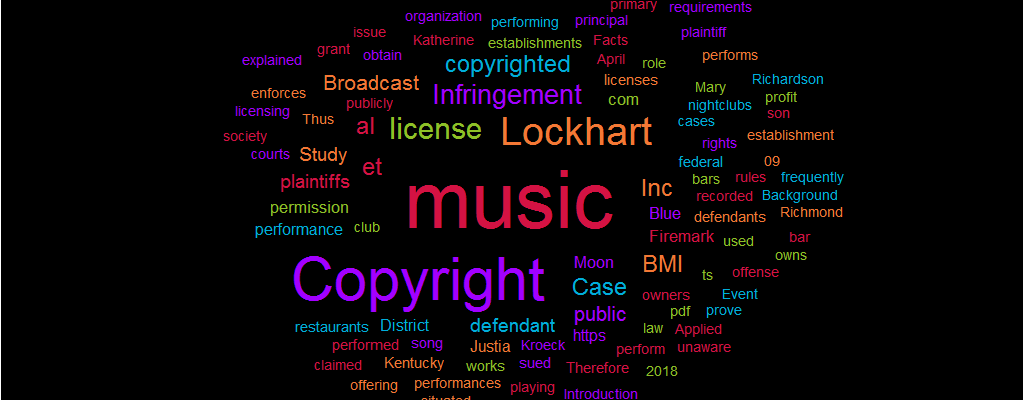Copyright Infringement Case Study
Publication Date:

Introduction
A public performance of copyrighted music or song without a license is a federal offense. However, most establishments where music is used, such as restaurants, bars, and nightclubs are unaware of these copyright rules (Firemark). On April 09, 2018, BMI et al. sued Mary Katherine Lockhart for copyright infringement (“Broadcast Music, Inc., et al v. Lockhart”). The plaintiffs claimed the defendant performed live music without permission or a license from plaintiffs.
Background Facts
Katherine Lockhart owns Blue Moon –a bar situated in Richmond, Kentucky. The establishment is managed by the defendant son, Richardson Lockhart. Blue Moon frequently performs recorded and live music.
Broadcast Music, Inc., the principal plaintiff, is a not-for-profit “performing rights organization.” Its primary role is to issue licenses or grant permission to businesses that want to perform copyrighted music in public (“Broadcast Music, Inc., et al v. Lockhart”). Therefore, BMI actively enforces the licensing requirements for the public performance of musical works.
BMI discovered that Lockhart’s club was offering live and recorded music without permission or a license from copyright owners. Therefore, the society explained to the defendant that Blue Moon needs to have a license to perform copyrighted music publicly. In spite of several warnings and appeals from BMI, Blue Moon continued its public performances of songs in the defendants’ repertoire. The US District Court for the Eastern District of Kentucky determined that Lockhart infringed the Copyright Act. Consequently, the defendant was entitled to pay plaintiffs $14,000.00 for statutory damages for copyright infringement.
Applicable Intellectual Property Rights and how it was Applied
The “Broadcast Music, Inc., et al v. Lockhart” is a case of copyright infringement by public performance. In order to prove their claim, the plaintiffs had to prove:
- The originality of the four compositions performed at Blue Moon.
- The plaintiffs’ ownership of the music copyrights
- The defendants had publicly performed the music in question
- Lockhartfailed to obtain a license or permission from copyright owners
Opinion
In my view, the law was useful and properly and effectively applied. For example, the defendant’s intentional failure to obtain a license or permission from the plaintiffs amounts to a violation of the copyright law (Firemark). Additionally, the outcome was appropriate and justified. For one, BMI had repeatedly sent letters asking Lockhart to seek a license for public performance, but the defendant refused. Lockhart also declined BMI’s suggestion that they (BMI and defendants) enter into a license agreement. Thus, the judgment was fair.
In summary, I can say that the decision on “Broadcast Music, Inc., et al v. Lockhart” case is a lesson to other business establishments. Copyrighted products are properties of copyright owners. Thus, public performances of copyrighted music without a license deserve punishments. Nonetheless, exclusions to when a license is mandatory have many limitations (Kroeck). Therefore, before attempting to play copyrighted works I will be sure to contact a copyright attorney to avoid possible lawsuit.
Works Cited
“Broadcast Music, Inc., et al v. Lockhart.” Justia, https://cases.justia.com/federal/district-courts/kentucky/kyedce/5:2018cv00215/85698/41/0.pdf?ts=1552471349
“Broadcast Music, Inc., et al v. Nolan Enterprises, Inc., et al.” Justia, https://cases.justia.com/federal/district-courts/ohio/ohsdce/2:2011cv00705/148314/22/0.pdf?ts=1411570411.
Firemark, Gordon. “Restaurants sued for playing music without ASCAP/BMI licenses.” Firemark.com, https://firemark.com/2007/08/23/restaurants-sued-for-playing-music-without-ascapbmi-licenses/
Kroeck, Louis. “Can I Use A Copyrighted Song At My Event?” Legal Zoom, https://info.legalzoom.com/can-use-copyrighted-song-event-22616.html